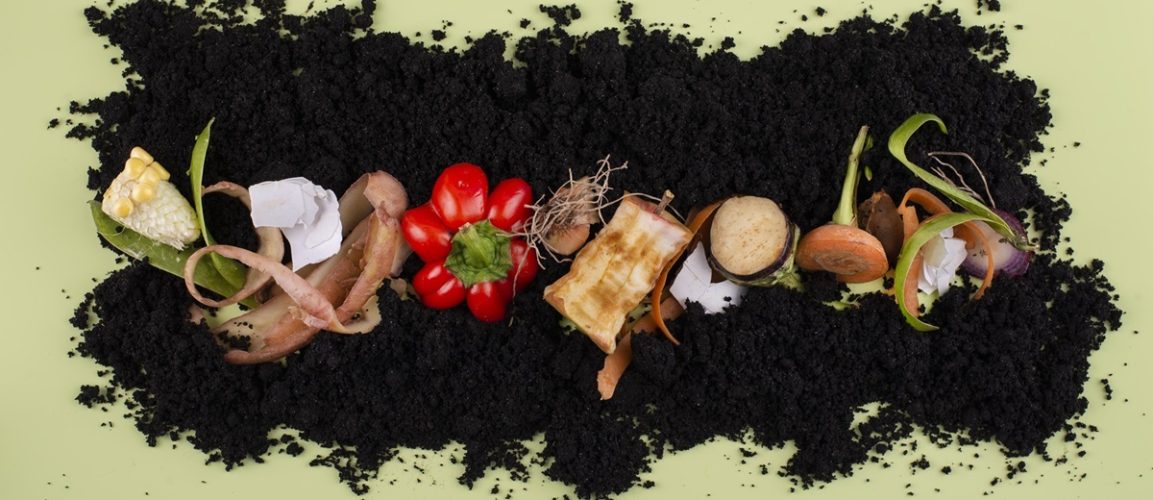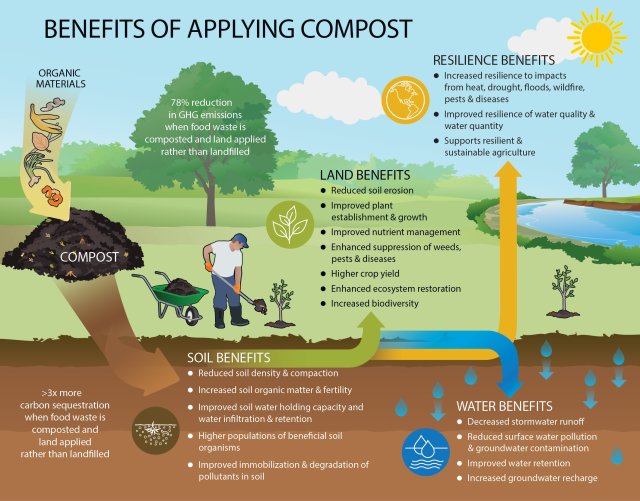What is Compost and What are the Benefits of Compost?

Compost is the dark, crumbly, earthy-smelling soil-like material formed when organic wastes (like kitchen scraps or yard debris) decompose naturally. In technical terms, composting is “the controlled aerobic decomposition of organic matter by microorganisms into a stable, humus-like soil amendment”. In practice, it means food peels, leaves, grass clippings and similar waste break down (with air, moisture and microbes) into a nutrient-rich material. This mature compost has unrecognizable original pieces, a neutral “earthy” scent, and contains balanced nutrients (nitrogen, phosphorus, potassium, etc.) that benefit plants. Instead of trashing organic waste, composting recycles it back into the soil, closing the loop from soil to soil.
How Composting Works
Composting is essentially accelerated nature. Microbes (bacteria and fungi) and helpful organisms (like worms) digest organic waste in a warm, oxygenated pile or bin. In a managed compost pile, conditions are kept optimal – the pile is turned or aerated and kept moist – so that microbes flourish and break down the waste in weeks or months. For example, modern composting devices shred and stir the material automatically to give oxygen to microbes; Kademe’s Yöntem 100 machine, for instance, grinds and aerates waste and can produce quality compost in just 2–3 weeks. Whether using a simple backyard bin, a worm (“vermicompost”) bin, or a small machine, the process is the same: organic residues are biologically converted into stable humus that plants can use.
Key Environmental Benefits of Compost
Waste Reduction and Climate
Composting diverts food scraps and yard waste from landfills. This cuts methane emissions, since organic matter in landfills decomposes anaerobically (without oxygen) and releases methane, a potent greenhouse gas. In fact, household food waste makes up a large portion of municipal waste, and processing it by composting instead of landfilling significantly reduces landfill volume and greenhouse gases. Composting also supports a circular economy by keeping nutrients and carbon “local” – the waste generated in a community is turned into compost used in that community, rather than being trucked away.
Soil Fertility and Structure
Compost greatly improves soil health. It adds organic matter that makes soils “breathe” and act like a sponge. For example, adding just 1% more organic matter can enable an extra 16,500 gallons of plant-available water per acre-foot of soil. The extra organic matter also increases soil porosity and aggregation, which helps roots grow and increases water infiltration. In depleted soils worldwide, adding compost boosts nutrient content and plant growth while reducing the need for synthetic fertilizers. Unlike instant-release chemical fertilizers, compost releases its nutrients slowly, feeding plants over time and reducing nutrient runoff into waterways.
Erosion and Water Conservation
Compost-rich soil holds moisture much better, helping plants survive dry periods. Healthy, compost-amended soil can absorb heavy rain without washing away. In fact, USDA research shows that compost dramatically improves rainfall penetration and cuts water runoff and soil erosion by over 75%. By retaining more water and anchoring the soil, compost prevents topsoil loss. This also protects streams and rivers by trapping sediment, nutrients and pesticides in the field rather than letting them wash out.
Balanced Nutrients and pH Regulation
Compost provides a balanced mix of nutrients and helps even out soil chemistry. It contains nitrogen, phosphorus, potassium and many micronutrients in proportions that support plant health. Because compost acts slowly, it feeds plants steadily rather than causing nutrient spikes. Importantly, compost can bind or neutralize contaminants – heavy metals and toxins in soil can become locked into harmless forms in the presence of compost – and it buffers soil pH toward neutral. This means compost can rehabilitate soils that are too acidic or alkaline, making them more hospitable for plant growth.
Enhanced Soil Life and Biodiversity
Compost teems with beneficial microorganisms and supports soil wildlife. Earthworms, fungi and billions of microbes multiply in compost-amended soil, continuing to break down residues and improve soil texture. This biodiversity is a key part of soil health – microbes help cycle nutrients, suppress plant diseases and improve root growth. Studies confirm that compost additions boost the population of good soil organisms and create a lively soil ecosystem. The image below shows an earthworm in compost-rich soil, illustrating how such creatures thrive in healthy, compost-enriched earth.

Practical Composting for Cities and Homes
Urban dwellers can easily compost too. Even in apartments or small yards, one can use simple methods: a small compost bin, a worm (vermicompost) box under the kitchen sink, or a countertop “Bokashi” fermenter. Many cities now offer curbside pickup or community drop-off of food scraps so residents can recycle organic waste. Community composting sites – at schools, gardens or parks – engage local residents and return compost to nearby green spaces. These small-scale programs keep organic materials in the neighborhood, reducing trucking and landfill impact.
Even without a yard, kitchen scraps like coffee grounds, vegetable peels or egg shells can go into a small bin or worm box. Over time these break down and can be used for balcony plants or community gardens. The U.S. EPA notes that community composting “builds local soil health” and sequesters carbon, while keeping nutrients within the community.
Benefits for Farmers and Gardens
For farmers and gardeners, compost is essentially free fertilizer. It strengthens soil so crops grow better and resist stress. According to USDA researchers, compost dramatically increases soil water infiltration and holds nutrients in place. Reducing fertilizer losses and erosion on farm fields. Rich soils with compost can withstand drought better, so plants stay healthy during hot spells. The USDA also emphasizes that healthy, organic-rich soil helps plants resist diseases and insects. By using compost, farmers cut their need for chemical fertilizers (saving costs and pollution) while rehabilitating worn-out soils. In certified organic agriculture, applying compost is even a regulatory requirement to maintain soil health.
Composting Machines and Devices
For institutions, restaurants or busy households, there are also compact composting machines. Kademe – a Turkish waste-technology firm – produces models like Yöntem 100 (for ~100 L/day) and Yöntem 500 (500 L/day). These units automatically shred food and garden waste and aerate them to speed up composting. For example, the Yöntem 100 machine reduces the natural composting time from months to just 2–3 weeks. It is small, energy-efficient, and can be placed in a kitchen, cafeteria or yard. The Yöntem 500 handles larger volumes (like in parks or small farms) and similarly produces high-quality compost quickly.
The compost output from these machines has all the usual benefits: it boosts soil aggregates, increases aeration and water retention, and supplies nutrients slowly. Kademe notes that its compost “strengthens soil structure, regulates pH and increases water-holding capacity” to help plants through drought. It also “provides plants with needed nutrients by slow release” and neutralizes toxins and heavy metals in the soil In other words, these devices simply automate and accelerate the composting process, making it easy for city offices, restaurants, or farms to turn their organic waste into usable compost on-site.
Composting is a simple, natural way to recycle organic waste and improve the environment. Whether on a city balcony, a community garden, or a farm, adding compost to soil pays big dividends – it feeds plants, conserves water, builds healthy soil life, and cuts pollution. By composting kitchen scraps and yard waste, each of us can contribute to cleaner cities and more productive farms. In short, composting turns “waste” into a valuable resource, making gardening and agriculture more sustainable for everyone.




